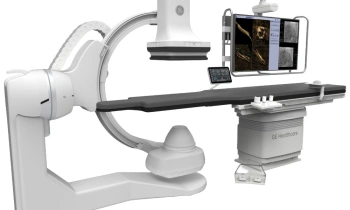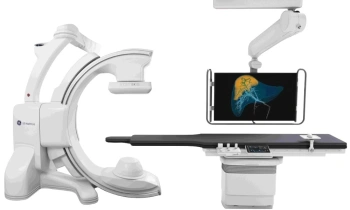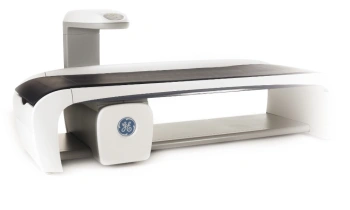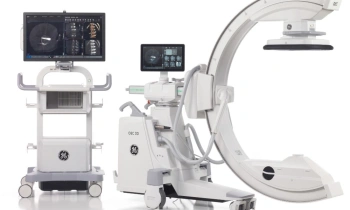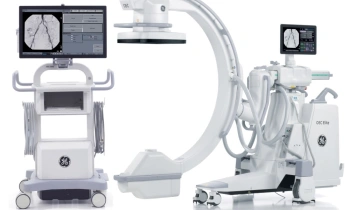News • Smart devices and more
New GE imaging tech and intelligent apps unveiled at RSNA
At RSNA 2019, GE Healthcare launches more than 30 new, imaging intelligent applications and smart devices designed to drive efficiency in radiology departments, aiming to double productivity and cost savings for systems by 2025.
For healthcare executives, the new offerings help systems to save costs, improve technology utilization, and increase patient volumes. Clinicians also will benefit from the new technologies through intuitive workflows, improved diagnostic confidence and less rework, allowing them to spend more time with patients. Healthcare inefficiencies lead to nearly $1 trillion of annual financial waste in the United States alone. Healthcare executives report costs and transparency as their number one concern moving into next year and need new solutions to help solve these challenges.
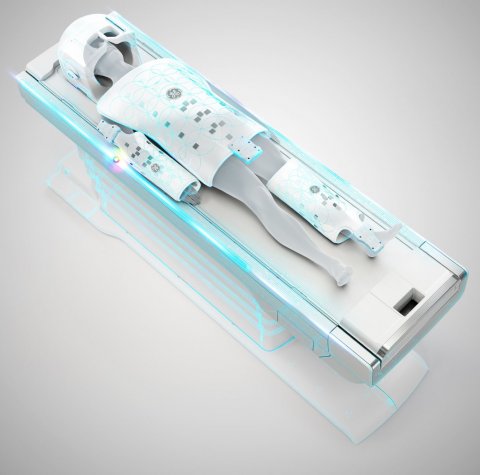
Image courtesy of GE Healthcare
- AIR Recon DL, an Edison application providing True Fidelity images, is a GE-first, deep-learning MRI reconstruction technology application designed to improve signal-to-noise and image sharpness and enable shorter scan times. Clinicians and technologists would no longer have to compromise between image quality and scan time with AIR Recon DL. This application was developed using a neural network trained on tens of thousands of images using GE’s Edison AI Platform.
- Critical Care Suite is an industry-first, FDA cleared collection of artificial intelligence (AI) algorithms embedded on a mobile X-ray device for triage. Built in collaboration with clinical partners, using GE Healthcare’s Edison platform, the AI algorithms help reduce the turn-around time it can take for radiologists to review a suspected pneumothorax, a type of collapsed lung. Additionally, Critical Care Suite’s quality AI algorithms help technologists reduce image quality errors and improve efficiency by simultaneously auto rotating images as well as analyzing and flagging protocol and field of view errors on-device. The Intelligent Auto Rotate AI alone can save highly-trained technologists at a medium to large size hospital more than 70,000 manual clicks – that amounts to nearly 20 hours, or three working days a year spent rotating chest images on portable X-ray machines.
- Edison Open AI Orchestrator is designed to orchestrate AI at scale for imaging workflows. The new Edison Open AI Orchestrator simplifies the implementation, deployment, support and scaling of multiple AI applications including from partners iCAD and MaxQ. Designed to seamlessly integrate clinical applications into the radiology PACS reading workflow, this offering reduces the complexity of multiple systems and algorithms working together that could lead to error and risk if implemented incorrectly.
- Revolution Maxima with AI-Based Auto Positioning is a powerful, high performing and reliable CT that maximizes every step of the CT workflow, from referral to report. Enabled with AI-based Auto Positioning technology, Revolution Maxima uses real-time depth sensing technology in order to generate a 3D model of a patient’s body to pinpoint the center of the scan range and automatically align it to the isocenter of the bore. Altogether, it is designed to simplify, streamline and automate the entire CT experience for one click, hands-free patient positioning.
- OEC Touch for OEC Elite CFD features a new control panel located right on the C-arm. During a variety of clinical procedures, C-arm technicians often move back-and-forth between the C-arm. While these movements are necessary, they can disrupt surgical flow and cause inefficiencies and block the surgeon’s view of the images during procedures. The new control panel, OEC Touch, is designed to eliminate the need to move to a separate workstation and reduce disruption during surgery. Accessible on a large, high-resolution touch screen with recognizable OEC color-coded icons, the OEC Touch features Live Zoom, Digital Pen, and additional capabilities designed to efficiently capture and review images during surgery.
- Embo Assist with Virtual Injection is an Edison application designed to help clinicians perform complex embolization procedures. This application is designed to allow clinicians to analyze the vasculature and simulate injections dynamically to help determine the embolization strategy to avoid embolizing healthy tissues in the brain or prostate with just one click. By leveraging data from GE Healthcare’s 3D CT HD images, Embo Assist with Virtual Injection is designed to provide clinicians with an intuitive solution to support clinical decision-making and drive efficiency in the interventional suite, thereby enabling precise, minimally invasive therapies.
- Clinical Command Centers are designed to improve outcomes and efficiency with new real-time decision support tools along with process improvement targeted using digital twins of patient flow. Each Clinical Command Center features 5-20 decision support apps or “Tiles” which are used systemwide as well as in the command center to pinpoint opportunities to reduce length of stay, increase imaging utilization, get ahead of patient bottlenecks or issues and much more. All in near real-time and in some cases predicting issues before they occur. Specific to radiology, the Imaging Expediter Tile enables active management of imaging utilization by prioritizing scans and identifying a range of issues, such as missing labs, which could disrupt flow to inpatients and outpatients. At Humber River Hospital in Toronto, Canada, the Imaging Expediter Tile has helped inpatients receive their imaging exams 16-27 percent faster depending on the modality, and has contributed to a 52 percent reduction in excess inpatient days. In the four years that Clinical Command Centers have been operational, the toolkit has helped to deliver significant and sustained measurable impact for hospitals in the United States, Canada and the United Kingdom.
By integrating artificial intelligence into existing workflows we’ve been able to not only improve scan quality and reduce steps, but we’ve also been able to spend more time caring for patients
Vincent Lombard
“Automation and smart technologies are not only the future of medical imaging but are essential as departments look to transform workflows and the patient experience,” said Dr. Vincent Lombard, the first clinical adopter of Revolution Maxima with AI-based Auto Positioning, and a radiologist at Centre Imagery Jacques Callot. “By integrating artificial intelligence into existing workflows we’ve been able to not only improve scan quality and reduce steps, but we’ve also been able to spend more time caring for patients.”
Several of the new smart devices and intelligent applications were developed using Edison, GE Healthcare’s secure intelligence platform that helps both GE Healthcare developers and select strategic partners to design, develop, manage, secure and distribute advanced applications, services and AI algorithms quickly. Updates to GE Healthcare’s portfolio follow the launch of the Edison Developer Program which expands the Edison ecosystem to accelerate the adoption and impact of advanced applications and developer services across health systems. The Edison Developer Program helps healthcare providers gain easier access to market-ready algorithms and applications by directly integrating these technologies into existing workflows.
“Now, more than ever, clinicians face tremendous pressure to deliver optimal patient care and clinical outcomes with fewer resources,” said Kieran Murphy, President and CEO of GE Healthcare. “By integrating data, intelligent software applications, and smart devices, we’re enabling clinicians to make faster, more informed decisions to give them time with what matters most: their patients.”
GE Healthcare is showcasing its efficiency-focused applications and devices at RSNA in the South Hall, Booth 4133.
02.12.2019






